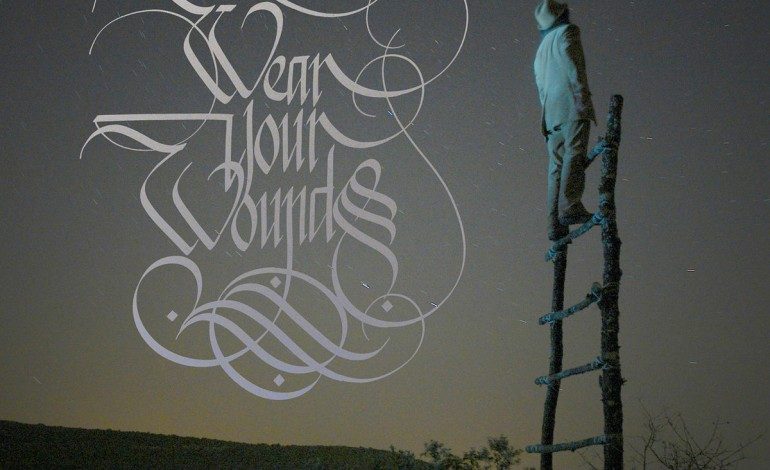

Sadboy on the MBTA
At long last, Converge frontman Jacob Bannon has pulled back the curtain on his mysterious side project Wear Your Wounds. That’s “side” and not “solo” project due to the minor fact that nearly the entire Deathwish Records roster turned out to contribute to the eponymous full-length. Everyone from Bannon’s bandmate and right-hand man Kurt Ballou to The Red Chord’s Mike McKenzie to the good ol’ boys from Trap Them have pitched a little something into this sorrowful serenade.
“But what kind of music do Wear Your Wounds play?” a savvy consumer might inquire. Well, the answer to that question will heavily depend on the musical predilections of the individual listener. Never has the old “eye of the beholder” adage been more apt than in the case of Wear Your Wounds’ tunes — although in this particular case, “inner ear of the beholder” might be a slightly better fit. Whatever particular sounds listeners are hoping to find in the music of Wear Your Wounds will surely find them, albeit in some twisted, diluted strand buried by the album’s thick musical fog. As best exemplified in the enveloping, washed-out guitar layers of “Breaking Point,” listening to WYW is much like watching waves crash on a beach for an extended period of time; at any one point, one’s only ever experiencing a small portion of something huge and dark and foreboding, and yet each fleeting glimpse overpours and teems with an unfathomable, unknowable amount of activity.
Before anyone asks, of course one will find fragments of every single style of heavy metal and hardcore offshoot that you could ever ask for — metalcore drums rage on in the background of each track like a California forest fire burning just over the sonic horizon. But a few mere steps beyond the heavy and banal reveal, ample folk spirit can be mined in the dour “Iron Rose.” The track sounds like Leonard Cohen if only the legend had fancied a Rhodes piano instead of an acoustic guitar…and was also a time traveler who managed to get ahold of a digital delay pedal. Piano balladry is the name of the game in both the deliberately clumsy chords of “Giving Up” and the record’s title track — even though the relentless crash cymbals and Halloween-esque synthesizer theme bury Bannon’s vocals and lyrics. And though “Hard Road to Heaven” is the only track completely bereft of any kind of singing, instrumental ambience forms the bulk of the album’s longer tracks, likening WYW to a film soundtrack written with the purpose of building ominous tension, suspense and gloom. Kurt Ballou should start scoring indie films with his mournful harmonic ring-outs. Hell, Trent Reznor did it — why not Beantown’s boy?
Speaking of Trent Reznor, an unmistakably industrial rock sequencer rhythm kicks off “Best Cry of Your Life,” a song with a title that would not sound the least bit out-of-place amidst the rest of Nine Inch Nails’ catalog. Despite the abundance of non-guitar instruments, this sudden, aggressive lurch into the harshly electronic stands out from everything else that WYW has to offer. Jacob Bannon even tries his hand at that weird, monotone type of “mixed too low in the electrical mire” talk-singing that Trent is so clearly fond of. It gets even more uncanny when “Shine” rolls around to showcase the exact type of stilted, gutted atmosphere that “Hurt” so masterfully presented to audiences in 1994, right down to the dull, percussive, quarter notes banged out on a muted acoustic guitar.
So what’s to make of this heavy soul-bearing? By all accounts, Bannon has accomplished his stated purpose with his new record. He’s shown us a part of his artistic identity that he hasn’t heretofore expressed, all encased in a newly textured musical shell. But then again, Wear Your Wounds’ lyrics aren’t really all that far from those that Bannon typically pens with Converge (though they are much more direct and much less overtly accusatory). In fact, after a record like All We Love We Leave Behind, that had arena rock refrains and brimmed with melancholic mid-pace, one could probably convince an unsuspecting old-school Converge fan that WYW was the Boston’s band latest effort. And on the subject of the album’s shortcomings, more than a handful the album’s of songs feel long because, well, they are just that. Four of the album’s nine songs break the seven-minute mark while relying on fairly repetitive structures. But if the debut’s occasionally glacial pace is that much of a bother, then one has clearly come to the wrong bar. WYW is truly beautiful, and equipped with far more vocal layers and stylistic nuance than one would ever dream the Deathwish crew to be capable of. Bannon’s project is like someone rearranged the pieces of a jigsaw puzzle to create an entirely different image that the toy’s makers didn’t even anticipate; and the album is certainly worth the time of anyone drawn to the heavy or the morose.
